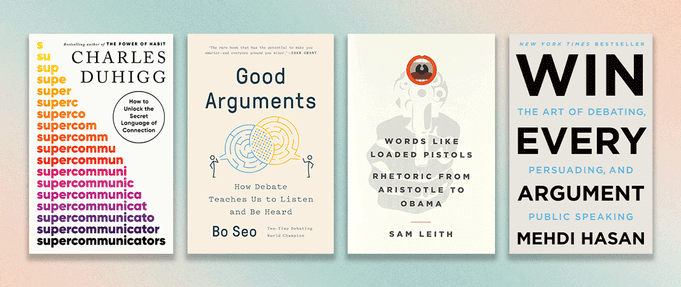What is debate? From the stage of formal tournaments to the halls of political power, debate shapes almost every aspect of our lives. Yet, as the world around us grows more polarized, debates become toxic, terrifying, and often unproductive.
How can we not only win arguments, but maintain our humanity while we’re having them? That’s where these seven books come in.
From time-honored rhetorical strategies to some of the most persuasive of modern speeches, from the ways in which arguments can tear us apart to the ways that debates held in good faith can help to bring us together, these books are must-reads for anyone who wants to win an argument—and keep friends while they do it.
After all, debate isn’t really about winning. It’s about changing minds (sometimes our own), making connections, solving problems, and shaping our ideas.
And with the tools provided by these books, you’ll be well on your way to doing just that—while also being armored against the rhetorical tricks of those who might not be arguing in good faith.
Here are seven books about the captivating art of debate.
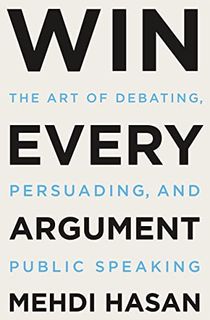
Win Every Argument
“MSNBC’s Mehdi Hasan isn’t one to avoid arguments,” says the back of this “entertaining primer on rhetorical techniques” (New York Times). Arguments, Hasan says, are the lifeblood of democracy. They help us solve problems and uncover new ideas. They can even be fun—but they can also be scary.
Fortunately, this “generationally talented interviewer” (Jonathan Swan, Emmy Award-winning reporter) spills the tricks of his trade in a book that “includes the kind of specific advice and applicable tactics that will make readers want to finish the book and immediately go find a sparring partner” (former White House Press Secretary Jen Psaki).
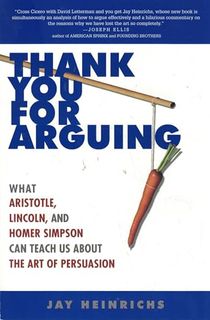
Thank You for Arguing
This “clever, passionate, and erudite” (Publishers Weekly) New York Times bestseller has been hailed as “the leading modern work on rhetoric” and is taught in more than 3,000 college courses.
Jay Heinrichs runs popular blogs about language and rhetoric, and in this hit book, he brings lessons from an array of sources, ranging from the usual suspects to the most unlikely of teachers.
With examples from Cicero and Abraham Lincoln to Homer Simpson, Chandler Bing, and Yoda, this indispensable introduction to the art of persuasion is one that every would-be debater needs in their back pocket, updated with new examples from our increasingly argumentative modern world.
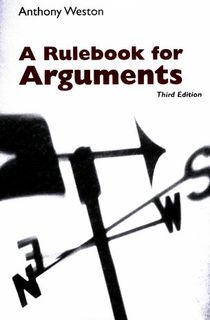
A Rulebook for Arguments
Anthony Weston is a professor of philosophy, so he’s no stranger to arguments. He takes the formidable lessons of his craft and applies them to direct “rules” that can help structure arguments.
In this “ultimate ‘how-to’ book, he helps anyone who wants to use reasons and evidence in support of conclusions, be clear instead of confusing, persuasive instead of dogmatic, and better at evaluating the arguments of others” (Debra Nails, Michigan State University).
Translated into eight languages, this popular primer is a perfect introduction to the rules that help make arguments work and prevent us from just devolving into yelling matches and name-calling.
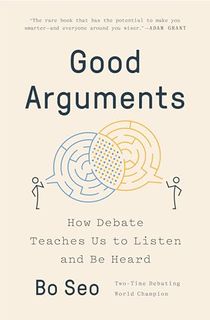
Good Arguments
A two-time world champion of debate and former coach of the Harvard debate team, Bo Seo tells his own life story while also bringing to readers the many lessons he’s learned in this “useful reflection on how to disagree” (Kirkus Reviews).
More than merely an “enlightening introduction to the style, function, and variety of formal debate,” Seo’s book is “an inspiring study of how good-faith arguments can bring people together rather than tear them apart” (Publishers Weekly)—something that seems especially important in our highly polarized times.
Read it to see why Booklist raved that it “offers much food for thought.”
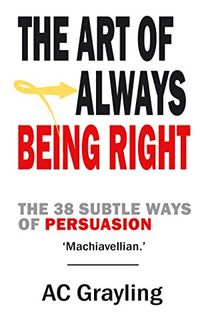
The Art of Always Being Right
In 1831, famous German philosopher Arthur Schopenhauer wrote this classic “dryly witty essay” (Sunday Telegraph), also known as “The Art of Winning an Argument.” In it, Schopenhauer treats not with logic but with the various “tricks, dodges, and chicanery” to which people “resort in order to be right in the end.”
Essentially, exploring not the validity or strength of an argument itself, but the various rhetorical and dialectical tricks that make an argument persuasive, compelling, or simply impossible to counter.
An indispensable guide to “all the dishonest tricks so frequently occurring in argument,” Schopenhauer’s classic work, now updated for the modern day, is so powerful that it led the Financial Times to warn, “Beware who you give this book to.”
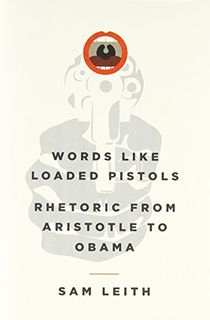
Words Like Loaded Pistols
Rhetoric and persuasive speaking have been with us for as long as humans have been talking to one another. In this “entertaining history of great oratory” (The New Yorker), Sam Leith “uses every tool in the rhetorician’s arsenal to argue for rhetoric’s continuing relevance” (Kirkus Reviews).
The result? A “fiendishly entertaining” (Publishers Weekly) book that not only examines the history of rhetoric, but picks apart the speeches of major figures from Aristotle to Obama to see what made them tick.
“The marvel is not that the old techniques still work,” Salon raves, “but that we ever persuaded ourselves that we could do without them.”
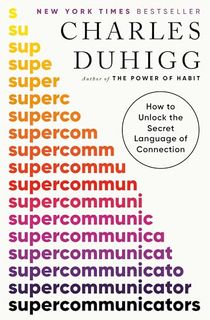
Supercommunicators
What is a supercommunicator? According to Charles Duhigg, bestselling author of The Power of Habit, communication is a superpower, and once you unlock its potential, you’ll find that you can connect with anybody.
In one of NPR’s Best Books of the Year, Duhigg takes readers from the inside of jury rooms and the offices of the CIA to the writers’ room of The Big Bang Theory with a “winning combination of stories, studies, and guidance that might well transform the worst communicators you know into some of the best” (Adam Grant, author of Think Again and Hidden Potential).
The result is a book that may just help you to unlock the power of communication and make yourself a supercommunicator, after all!
Featured image: Amin Mario / Canva
